动词不定式作宾语及双宾语结构解析【含答案】
英语句子成分详解
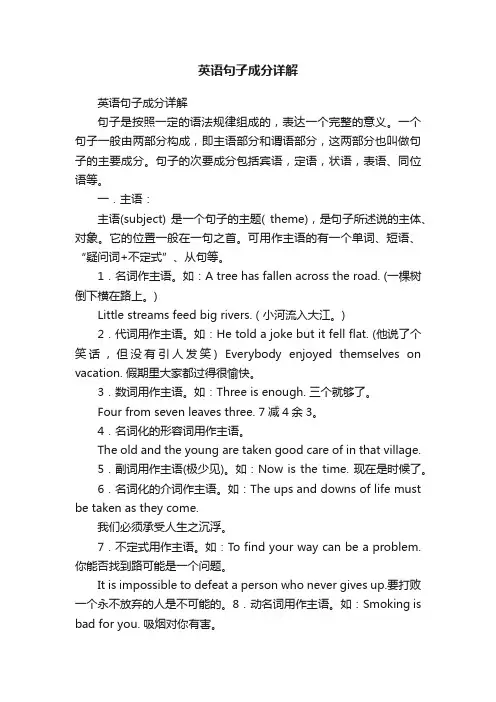
英语句子成分详解英语句子成分详解句子是按照一定的语法规律组成的,表达一个完整的意义。
一个句子一般由两部分构成,即主语部分和谓语部分,这两部分也叫做句子的主要成分。
句子的次要成分包括宾语,定语,状语,表语、同位语等。
一.主语:主语(subject) 是一个句子的主题( theme),是句子所述说的主体、对象。
它的位置一般在一句之首。
可用作主语的有一个单词、短语、“疑问词+不定式”、从句等。
1.名词作主语。
如:A tree has fallen across the road. (一棵树倒下横在路上。
)Little streams feed big rivers. ( 小河流入大江。
)2.代词用作主语。
如:He told a joke but it fell flat. (他说了个笑话,但没有引人发笑) Everybody enjoyed themselves on vacation. 假期里大家都过得很愉快。
3.数词用作主语。
如:Three is enough. 三个就够了。
Four from seven leaves three. 7减4余3。
4.名词化的形容词用作主语。
The old and the young are taken good care of in that village.5.副词用作主语(极少见)。
如:Now is the time. 现在是时候了。
6.名词化的介词作主语。
如:The ups and downs of life must be taken as they come.我们必须承受人生之沉浮。
7.不定式用作主语。
如:To find your way can be a problem.你能否找到路可能是一个问题。
It is impossible to defeat a person who never gives up.要打败一个永不放弃的人是不可能的。
8.动名词用作主语。
句子成分和句子结构讲解有答案
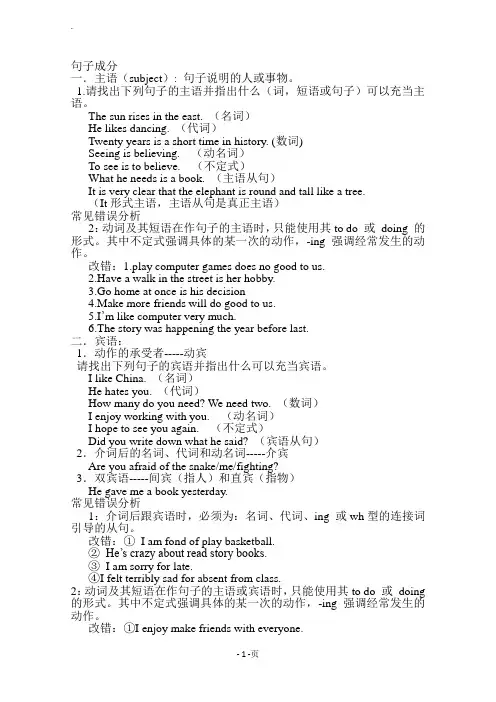
句子成分一.主语(subject): 句子说明的人或事物。
1.请找出下列句子的主语并指出什么(词,短语或句子)可以充当主语。
The sun rises in the east. (名词)He likes dancing. (代词)Twenty years is a short time in history. (数词)Seeing is believing. (动名词)To see is to believe. (不定式)What he needs is a book. (主语从句)It is very clear that the elephant is round and tall like a tree.(It形式主语,主语从句是真正主语)常见错误分析2:动词及其短语在作句子的主语时,只能使用其to do 或doing 的形式。
其中不定式强调具体的某一次的动作,-ing 强调经常发生的动作。
改错:1.play computer games does no good to us.2.Have a walk in the street is her hobby.3.Go home at once is his decision4.Make more friends will do good to us.5.I’m like computer very much.6.The story was happening the year before last.二.宾语:1.动作的承受者-----动宾请找出下列句子的宾语并指出什么可以充当宾语。
I like China. (名词)He hates you. (代词)How many do you need? We need two. (数词)I enjoy working with you. (动名词)I hope to see you again. (不定式)Did you write down what he said? (宾语从句)2.介词后的名词、代词和动名词-----介宾Are you afraid of the snake/me/fighting?3.双宾语-----间宾(指人)和直宾(指物)He gave me a book yesterday.常见错误分析1:介词后跟宾语时,必须为:名词、代词、ing 或wh型的连接词引导的从句。
动词不定式和双宾语
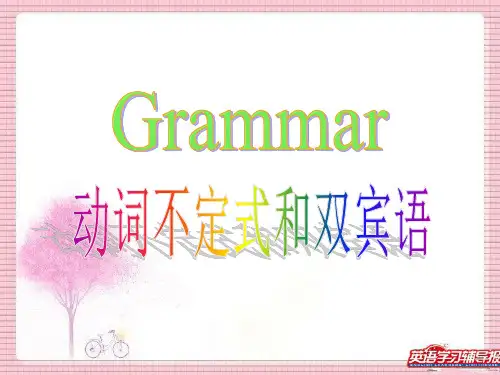
hand sb. sth. = hand sth. to sb. send sb. sth. = send sth. to sb. show sb. sth. = show sth. to sb. leave sb. sth. = leave sth. to sb. teach sb. sth. = teach sth. to sb. buy sb. sth. = buy sth. for sb. cook sb. sth. = cook sth. for sb. read sb. sth. = read sth. for sb.
2. 双宾语 有些动词可以接两个宾语,即指人的间 接宾语和指物的直接宾语,这两个宾语 称为“双宾语”。结构为“及物动词+
间宾 +直宾”。有时还可用“及物动词+直宾 +to/for+间宾” 结构来表达。
I passed him a bottle of apple juice.=
I passed a bottle of apple juice to him. 我递给他一瓶苹果汁。
后接介词to 的动词有:give, show, pass, lend, take, tell 等;后接介词for的动词 有:buy, make, cook, get, sing, read等。 一般来讲,for表示“为某人”,而to表
示 “给某人”,即表示某人接受或收到了
某 物。如:
give sb. sth. = give sth. to sb.
在英语中,并不是所有两个动词连用时 都采用动词+不定式的形式,一般来 说,用不定式时,所表示的多为将来的 行为。但是在具体使用中同学们还要注 意记忆,因为动词不同,对其后动词形 式的要求也就不同。常见的后面接“to
常用的18个双宾语结构
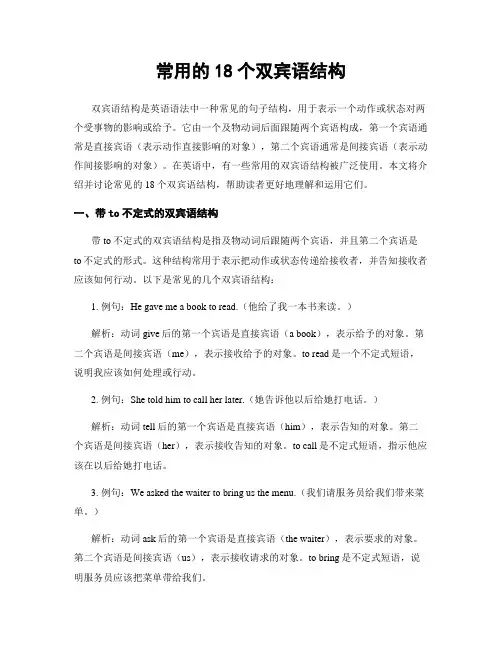
常用的18个双宾语结构双宾语结构是英语语法中一种常见的句子结构,用于表示一个动作或状态对两个受事物的影响或给予。
它由一个及物动词后面跟随两个宾语构成,第一个宾语通常是直接宾语(表示动作直接影响的对象),第二个宾语通常是间接宾语(表示动作间接影响的对象)。
在英语中,有一些常用的双宾语结构被广泛使用。
本文将介绍并讨论常见的18个双宾语结构,帮助读者更好地理解和运用它们。
一、带to不定式的双宾语结构带to不定式的双宾语结构是指及物动词后跟随两个宾语,并且第二个宾语是to不定式的形式。
这种结构常用于表示把动作或状态传递给接收者,并告知接收者应该如何行动。
以下是常见的几个双宾语结构:1. 例句:He gave me a book to read.(他给了我一本书来读。
)解析:动词give后的第一个宾语是直接宾语(a book),表示给予的对象。
第二个宾语是间接宾语(me),表示接收给予的对象。
to read是一个不定式短语,说明我应该如何处理或行动。
2. 例句:She told him to call her later.(她告诉他以后给她打电话。
)解析:动词tell后的第一个宾语是直接宾语(him),表示告知的对象。
第二个宾语是间接宾语(her),表示接收告知的对象。
to call是不定式短语,指示他应该在以后给她打电话。
3. 例句:We asked the waiter to bring us the menu.(我们请服务员给我们带来菜单。
)解析:动词ask后的第一个宾语是直接宾语(the waiter),表示要求的对象。
第二个宾语是间接宾语(us),表示接收请求的对象。
to bring是不定式短语,说明服务员应该把菜单带给我们。
4. 例句:They hired a guide to show them around the city.(他们雇了一个导游向他们展示城市。
)解析:动词hire后的第一个宾语是直接宾语(a guide),表示雇佣的对象。
Module 5 Grammar重点语法动词不定式做宾语和双宾语-八年级英语上册单元重难点易错题精
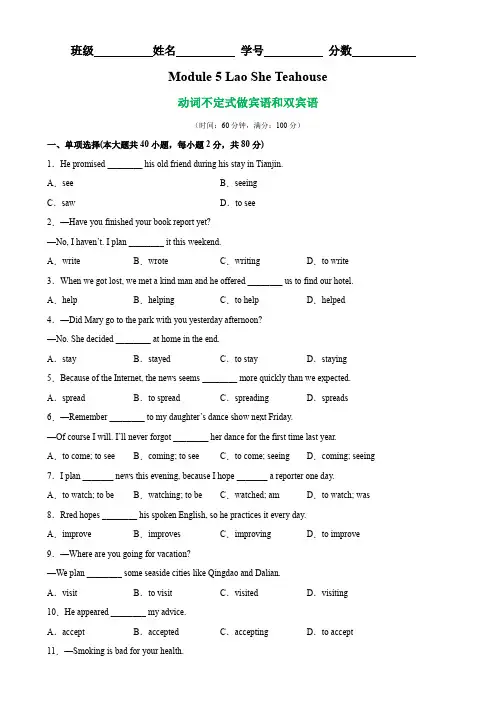
班级姓名学号分数Module 5 Lao She Teahouse动词不定式做宾语和双宾语(时间:60分钟,满分:100分)一、单项选择(本大题共40小题,每小题2分,共80分)1.He promised ________ his old friend during his stay in Tianjin.A.see B.seeingC.saw D.to see2.—Have you finished your book report yet?—No, I haven’t. I plan ________ it this weekend.A.write B.wrote C.writing D.to write 3.When we got lost, we met a kind man and he offered ________ us to find our hotel. A.help B.helping C.to help D.helped 4.—Did Mary go to the park with you yesterday afternoon?—No. She decided ________ at home in the end.A.stay B.stayed C.to stay D.staying 5.Because of the Internet, the news seems ________ more quickly than we expected. A.spread B.to spread C.spreading D.spreads 6.—Remember ________ to my daughter’s dance show next Friday.—Of course I will. I’ll never forgot ________ her dance for the first time last year.A.to come; to see B.coming; to see C.to come; seeing D.coming; seeing 7.I plan _______ news this evening, because I hope _______ a reporter one day.A.to watch; to be B.watching; to be C.watched; am D.to watch; was 8.Rred hopes ________ his spoken English, so he practices it every day.A.improve B.improves C.improving D.to improve 9.—Where are you going for vacation?—We plan ________ some seaside cities like Qingdao and Dalian.A.visit B.to visit C.visited D.visiting 10.He appeared ________ my advice.A.accept B.accepted C.accepting D.to accept 11.—Smoking is bad for your health.—You're right. I decided ________ it up.A.to give B.giving C.give D.with giving12.Do you want ________ the music club?A.join B.joining C.to join D.joins13.Paul wants an actor because he likes acting.A.to be B.be C.become D.becoming14.—Smoking is bad for your health.—You're right. I decided ________ it up.A.to give B.giving C.give D.with giving15.Hearing the doorbell, she stopped ________ the door at once.A.to open B.opening C.open D.opens16.You can’t expect ________ any friends if you are not friendly to others.A.to have B.having C.had D.have17.My grandfather wants _____ around the world because he enjoys _____ new places.A.to travel; to see B.to travel; seeing C.traveling; seeing D.traveling; to see18.My father often refuses me watch TV show. I think it’s unfair.A.to let B.let C.letting D.lets19.—Please remember ________ your English book with you tomorrow, I want to borrow it.—OK, no problem.A.bring B.brings C.to bring20.I prefer in the peaceful countryside to living in the big city, because that makes me ________. A.lived ; relaxed B.to live ; relaxing C.living ; relaxed D.live ; relax21.—Many students in France hope ________Beijing.—Yes, they are looking forward to visiting China soon.A.to visit B.visit C.visiting D.visited22.I managed ________ the work on time although it was very difficult.A.finish B.finishing C.to finish D.finished23.Sally decided ________ sorry ________ her parents.A.said; in B.to say; atC.to say; to D.saying; to24.I plan _______ for a few minutes. Would you mind _______ the windows for me? It's too cold.A.to sleep; to close B.sleeping; closing C.to sleep; closing25.What fine weather it was! We decided __________.A.to not go out B.not to go out C.to go out D.going out26.If you promise ________ hard to your parents, you must keep your promise. Show them your resolution. A.working B.to work C.work27.— Lucy, do you have a plan for the coming holiday?— I plan ________ one of my friends. There will be a tea party in her house.A.visited B.visit C.visiting D.to visit28.All of us agreed ________old people in the old people's home.A.help B.helped C.to help D.helping29.Cindy wishes ________ the train to Beijing with her parents.A.to take B.takes C.take D.taking30.My friend promised ________ to the museum with me.A.go B.to go C.going D.went31.I like watching the news every night. I hope ________ what’s going on around the world.A.find out B.finding out C.to find out D.found out32.Susan wanted to be independent of her parents. She tried ______alone, but she didn't like it and moved back home.A.living B.to live C.to be living D.having lived33.—Uncle Wang plans ________ to the mountains and take some photos tomorrow.—That sounds good.A.go B.to go C.going D.goes34.—Don’t forget ________ your homework, Tina.—I won’t. Thanks for ________ me, Mom.A.doing; telling B.doing; to tell C.to do; telling D.to do; to tell35.It’s so hot today. Susan plans ________ swimming after school.A.to go B.going C.goes D.go36.I want ________ the blue T-shirt.A.get B.gets C.to get D.getting37.I don’t hope ________ this job. It’s important to me.A.losing B.lost C.loses D.to lose38.Daniel, remember ________ up from your reading or writing every 30 minutes and let your eyes have a rest. A.stand B.standing C.stood D.to stand39.It was a nice day, so we decided ________ for a walk.A.go B.went C.to go D.going 40.Sally volunteered________ a veterinarian (兽医) to help the sick animals in the zoo. A.be B.being C.to be D.to being 二、用所给单词的正确形式填空(本大题共20小题,每小题1分,共20分)41.I hope ________ (watch) the action movie one day.42.I want to __________the travel plan with my dad. (discussion)43.I am sure ________ (pass) the exam.44.We need ________ (go) to bed before 11:00 every night.45.I hope ________ (find) out what's going on around the world.46.We decided ______ (not go) camping because of the heavy rain.47.Everyone wants __________ (have) a strong body.48.Don’t forget ________(send)the letter.49.Lisa likes drawing, so she wants ________ (join) the art club.50.I refuse ________ (answer) that question.51.Please remember _______ (lock) the door when you leave.52.Linda likes ________ (buy) some food for her mom after school.53.We should try _____(do) everything well.54.My father is planning ______ (fix) the broken table.55.They will choose __________(take) a boat trip this time.56.Always stop ________ (enjoy) the beauty around you. It’s boring to keep running. 57.I don’t know exactly how we’ll manage ________ (finish) the work on time. 58.My father didn’t agree __________ (take) a vacation on the beach.59.Mom, I volunteer ________ (wash) the bowls today.60.They would like ________ (have) the same trousers.参考答案:1.D【详解】句意:他答应在天津停留期间去看望他的老朋友。
动词不定式做主语,宾语,及双宾语结构
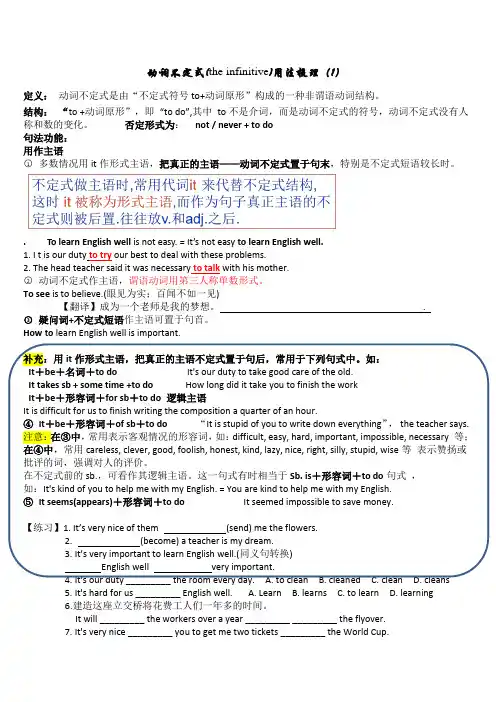
动词不定式(the infinitive)用法梳理(1)定义:动词不定式是由“不定式符号to+动词原形”构成的一种非谓语动词结构。
结构:“to +动词原形”,即“to do”,其中to不是介词,而是动词不定式的符号,动词不定式没有人称和数的变化。
否定形式为:not / never + to do句法功能:用作主语○1多数情况用it作形式主语,把真正的主语——动词不定式置于句末,特别是不定式短语较长时。
. To learn English well is not easy. = It’s not easy to learn English well.1. I t is our duty to try our best to deal with these problems.2. The head teacher said it was necessary to talk with his mother.○2动词不定式作主语,谓语动词用第三人称单数形式。
To see is to believe.(眼见为实;百闻不如一见)【翻译】成为一个老师是我的梦想。
.○3疑问词+不定式短语作主语可置于句首。
How to learn English well is important.补充:用it作形式主语,把真正的主语不定式置于句后,常用于下列句式中。
如:It+be+名词+to do It's our duty to take good care of the old.It takes sb + some time +to do How long did it take you to finish the workIt+be+形容词+for sb+to do 逻辑主语It is difficult for us to finish writing the composition a quarter of an hour.④It+be+形容词+of sb+to do “It is stupid of you to write down everything”,the teacher says. 注意:在③中,常用表示客观情况的形容词,如:difficult, easy, hard, important, impossible, necessary 等;在④中,常用careless, clever, good, foolish, honest, kind, lazy, nice, right, silly, stupid, wise等表示赞扬或批评的词,强调对人的评价。
动词不定式作宾语的用法教案
动词不定式作宾语的用法教案【引入】(10min)动词不定式在英语学习中起到非常重要的作用,它可以用作动词的不同形式,例如:主动语态和被动语态、肯定和否定句等。
我们今天要学习的是动词不定式作宾语的用法,这是一种常见的语法结构,对于英语学习者来说非常重要。
接下来,我们将从三个方面对此进行详细讲解。
【主体内容】(60min)1.动词不定式作及物动词宾语动词不定式可以作及物动词的宾语,即在句子中不直接表达行为者落实在对象上,而是以不定式的形式表示,如:I want to play football with my friends.我想和朋友们一起踢足球。
在这个例句中,“want”是及物动词,后面的不定式“to play football with my friends”则是它的宾语。
动词不定式通常由“to + 动词原形”构成,当然,有些动词还可以接不定式的“不定式形式”,例如:“want/wish/desire/hope/attempt/pretend/intend (想要/希望/渴望/希望/努力/假装/打算)”。
此外,有些及物动词可以接双宾语,即直接和间接宾语,其中的直接宾语就可以是动词不定式,如:I will buy him a book to read.我会给他买一本书看。
在这个例句中,“buy”是及物动词,而“book”是直接宾语,“to read”则是另一个间接宾语。
2.动词不定式作介词宾语动词不定式也可以作介词的宾语,如下:I am interested in reading books.我喜欢读书。
在这句话中,“interested in”是介词,后面的“reading books”就是介词宾语。
同样,“interested in”还可以用其他不定式来代替,例如:“keen on/fond of/enthusiastic about/curious about/excited about(喜欢/爱好/热衷于/好奇/激动)”。
动词不定式
动词不定式&双宾语一、动词不定式1.动词不定式作宾语:动词+to do(带to不定式)动词不定式置于谓语动词之后,作动词的宾语,表明意图、希望或决定的内容。
常见的动词有:plan, decide, hope, want, agree, offer, try, like, love, ask, start, remember,learn, happen等。
如:I hope to see the film this weekend.They decided to visit the Great Wall next year.2.动词不定式作宾语补足语:(1).宾语补足语是用来补充说明宾语的。
表示宾语的状态、特征、身份等。
可接动词不定式作宾补的有:ask, tell, allow, help, would like, expect, warn等。
如:The WWF chose the panda to be its symbol.I ask my mother to help me.(2).使役动词:let, make等后面接不带to的动词不定式作宾补。
如:He makes everyone laugh.(3).感官动词:see, hear, notice, watch, listen to等后面接不带to的动词不定式作宾补。
如:I hear her sing this song.3.动词不定式的否定式:not to do sth./ not do sth.如:She tells me not to touch anything.4.动词不定式作目的状语:表示“做某事是为了什么”。
此时,不定式既可以放在句首,也可以放在句尾。
如:I revised my lessons carefully to get good marks in the test.= To get good marks, I revised my lessons carefully.为了在考试中取得好成绩,我认真地复习功课。
八年级英语动词不定式+双宾语讲解及练习
八年级英语动词不定式+双宾语讲解及练习专题三:动词不定式+双宾语一.动词不定式含义当我们要表示“想做某事、需要做某事或决定做某事”时,就会出现两个动词连用的情况,这时应如何表达呢?同学们自然会想到want to do sth。
need to do sth.和decide to do sth.等表达方式。
行为动词后的动词都采用了“to+动词原形”的结构。
我们把这种结构称为动词不定式。
动词不定式没有人称和数的变化,在句中不能作谓语。
二.动词不定式的功能1.动词不定式作宾语(1)动词+to do sth.表示的多为将来的行为。
如:want to do sth。
/ hope to do sth。
/ learn to do sth。
/ try to do sth。
/ decide to do sth。
/ forget to doXXX to do sth。
/ stop to do sth./ plan to do sth.等(2)to偶然可省略,布局为动词+do sth.had better do sth。
/ why not do sth.2.动词不定式作宾语补足语(1)宾语补足语是对宾语的补充说明,结构:“动词+宾语+动词不定式”。
其否定结构要在todo前面加not,构成not to do。
如:allow sb。
to do sth。
/ choose sb。
to do sth。
/ want sb。
to do sth。
/ tell sb。
to do sth。
/ ask sb。
to doXXX(2)在表示感觉、祈使等意义的动词help。
make。
let。
have。
feel。
see等后接不带to的不定式。
3.动词不定式作目的状语(1)假如透露表现“做某事是为了甚么”,能够用动词不定式透露表现目标,常与soas,in order等组成短语不定式既可以放在句首,也可以放在句尾。
如:XXX to have rest.=To have rest。
动词不定式双宾语
第三种句型: to get (get) to • He is always the first _________ school . to know(know) the • I am the last one________ news.
To do 不定式
功能 特点 It is +形容词+to do sth It take sb+时间+to do sth 例句 It is easy to learn English.
1.The True Story of Ah Q describes the hard life of Ah Q and makes people ______ about society. A to thinking B to think C think D thinking play 2.The teacher makes his students______(play) basketball.
找找课文中的不定式
1.I want to see the Beijing Opera. 2.Lingling offered to take me there. 3.It is difficult to understand the words. 4.We only planned to watch for an hour. 5.I hope to understand more next time. 6.It allows people to get closer to them. 7.it’s sad to think of pandas and other animals in danger.
怎么记呢?
有了希望和计划 (hope/plan) 决定努力学习 (try/decide) 主动同意父母 (offer/agree) 成功不再是碰巧 (happen)
- 1、下载文档前请自行甄别文档内容的完整性,平台不提供额外的编辑、内容补充、找答案等附加服务。
- 2、"仅部分预览"的文档,不可在线预览部分如存在完整性等问题,可反馈申请退款(可完整预览的文档不适用该条件!)。
- 3、如文档侵犯您的权益,请联系客服反馈,我们会尽快为您处理(人工客服工作时间:9:00-18:30)。
动词不定式作宾语及双宾语结构解析
1. 我们经常需要表达“同意做某事” 或“决定做某事”等句子,这种一个句子连续出现两个动词的情况下,我们要用到动词不定式作宾语,即agree / decide to do sth.。
初中阶段我们常见后接动词不定式作宾语的动词有:plan,decide,want, agree, try, wait, wish, hope等。
例如:
I want to talk to Tom. 我想和汤姆谈话。
2. 双宾语就是有些动词后面跟直接宾语和间接宾语。
直接宾语指的是动词所涉及的物,间接宾语是指动词所涉及的人。
例如:
They gave him a watch. 他们给了他一块手表。
这里的him是间接宾语,a watch是直接宾语,间接宾语和直接宾语同时出现时叫双宾语。
英语中,有许多及物动词后面能跟双宾语,如:give, bring, lend, pass, send, show, leave, buy, tell, teach, sell, write, buy, sing等。
例如:
He teaches us English. 他教我们英语。
The old man told us a story yesterday.
那位老人昨天给我们讲了一个故事。
★注意:“及物动词+间接宾语+直接宾语”的结构一般可以改写为“及物动词+直接宾语+for / to sb.”的结构。
例如:
She bought me some presents.
=She bought some presents for me.
她给我买了一些礼物。
Please show me your new book.
=Please show your new book to me.
请给我看看你的新书。
【跟踪练习】同义句改写,每空一词。
1. I hope I can get higher marks next time.
I hope_______________ higher marks next time.
2. He makes a plan to do some sightseeing this summer holiday.
He _____________________ do some sightseeing this summer holiday.
3. You must bring me your homework tomorrow.
You must____________ your homework _____________ me tomorrow.
4. Please get me something to drink.
Please ____________ something ________________ me to drink.
5. She taught some new songs to us yesterday.
She _______________________ some new songs yesterday.
Key:
1. to get
2. plans to
3. bring; to
4. get; for
5. taught us。
